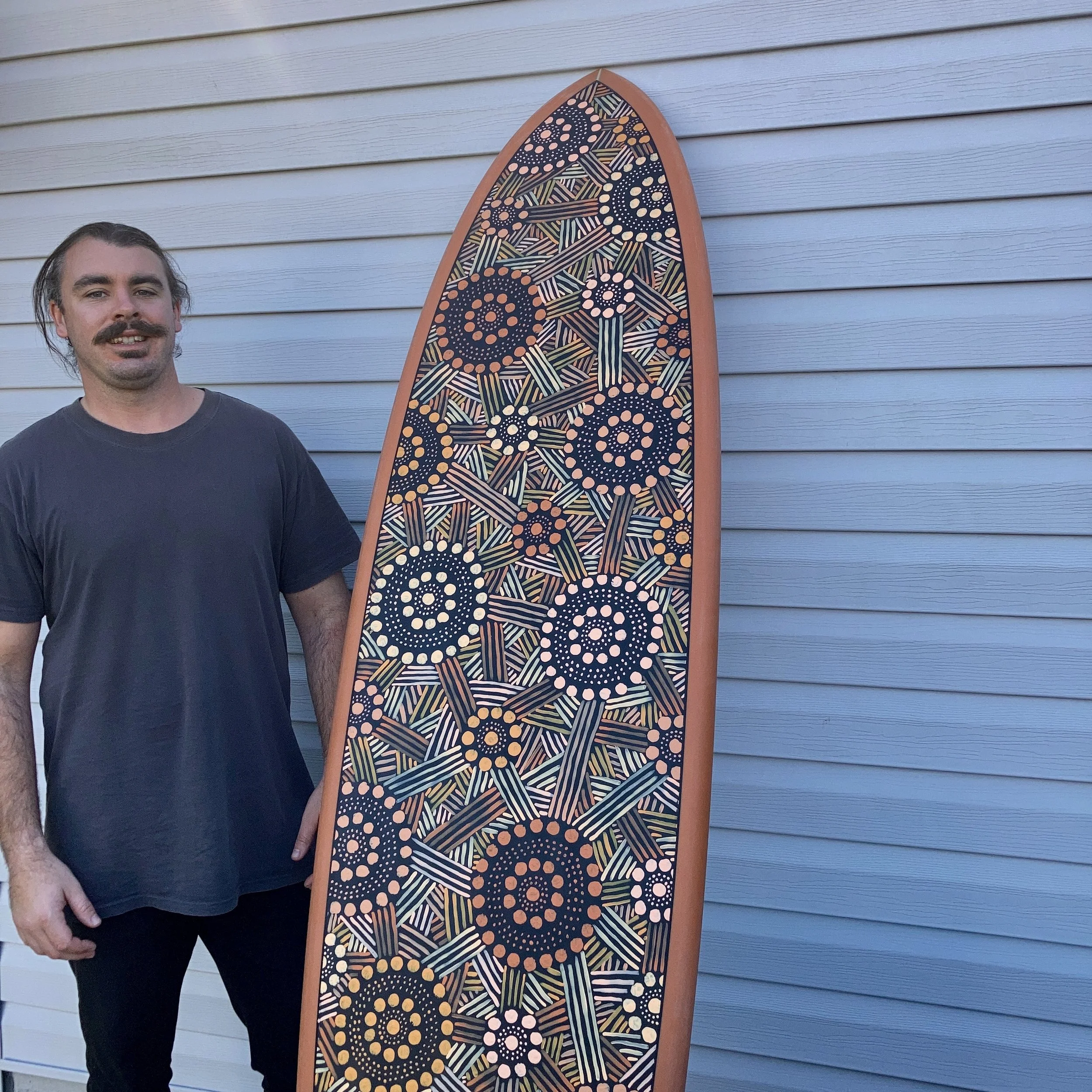Could it be?
November 2023
Hey there Caddyshackers!
November! How? *insert mind blown emoji here
World AIDS Day is around the corner
Have you entered the draw to win the stunning surfboard by Zachary Bennett-Brook of Saltwater Dreamtime?
If you haven’t, now is a great time to enter, with the board being drawn on 1st December in recognition of World AIDS Day.
Talking World AIDS Day, we thought it would be a good month to update you on some exciting things that are happening in the space.
Going Down Down Down
Global AIDS deaths fell to 650,000 in 2021, down by more than 11% since 2019. While the fight is far from over and huge challenges still remain, it's an extraordinary achievement. The tens of thousands of activists, donors and healthcare workers who made it happen deserve more recognition.
A recap:
HIV is spread through certain bodily fluids, including blood, semen, vaginal fluids, and breast milk. It can be transmitted through unprotected sexual contact, injecting drug use, unsterile piercing and tattooing and mother-to-child transmission during pregnancy, birth or breastfeeding.
Unsure if you need an HIV test? Answer a few questions on this quiz and find out when to test for HIV. Living healthy with HIV is now a reality. If you think you have been exposed to HIV in the last three months, it is important to speak to a doctor or visit a sexual health clinic.
Like other HIV tests, the atomo HIV self-test has a window period of three months. This means that the test may not detect HIV that has been acquired in the last three months. Another option to test is to order a dried blood spot (DBS) test from NSW Health, which is a free, easy and private way to test for HIV and hepatitis C. Order one here. Just take a few drops of blood from your finger, mail the test back and get your results by phone, text or email.
Side note: Acquired Immunodeficiency Syndrome (AIDS) is a late stage of HIV infection. AIDS is diagnosed when a person with HIV infection has a severely damaged immune system so that they develop a disease caused by an organism that doesn’t usually affect healthy people. AIDS is rare in Australia these days due to medical advancements in both prevention and treatment of HIV. Read on, we are going to chat about this more.
But isn't there a vaccine for HIV?
Although there have been significant advances in the treatment and management of HIV, it is not yet a curable infection, and there is still no vaccine available to provide protection. If you do get HIV, it's possible to manage the infection and reduce the risk of transmission to others by taking medications called antiretroviral therapy (ART).
ART reduces the amount of virus in the body (also known as the "viral load") which can lead to an “undetectable viral load” meaning a person cannot transmit the virus to others, as there is simply not enough virus present to do so. This has been a game changer, particularly for couples where one partner is HIV positive.
The Zeitgeist
Shout out to some of our fav shows about HIV
Buckle up! This masterpiece from the creator of Queer As Folk (UK) is as devastating as it is endearing.
A heartfelt chronicle of young friends navigating the joys, heartbreak, and outlandish parties that await them amidst the AIDS epidemic in 1980s London.
It gives all the feels.
A four-part ABC musical drama inspired by Australia's radical response to AIDS in the 1980s.
It tells the story of a community grappling with a terrifying new disease. With no cure in sight, they realise they will need something truly radical to survive, trust.
This was releases in March 2023 and is a must see.
Rampant-How a city stopped a plague
If you really want some cutting-edge history, check out this doco on ABC iview. Rampant is the story of AIDS in Australia in the early 80s, and how our response to the disease - so radically different to that in the USA and other countries with conservative governments - made us world leaders in controlling the virus, which had the potential to become a plague.
Pre-exposure prophylaxis (PrEP)
For all of this history, there have been fantastic medical advances in Australia around HIV prevention. This prevention is known as PrEP is a medication that prevents HIV infection. It can be taken daily, on-demand or periodically around the time of sex according to your prescribed dosing schedule. It is an effective way for people who are at high risk of HIV to reduce their risk of getting infected. PrEP is a combination of two medications that work by blocking HIV from taking hold and spreading in the body.
PrEP is recommended for people who are at high risk of HIV infection, such as:
Men who have sex with men
People who inject drugs
People who have sex with HIV-positive partners
People who have multiple sexual partners
People who have a history of sexually transmitted infections (STIs)
If you think you may be at risk of HIV infection and are interested in PrEP, talk to a healthcare provider and they can help you determine if PrEP is right for you and can provide you with more information about how to take it and how to use it effectively.
Future HIV landscape in Australia?
Nationwide figures, released by the Kirby Institute in July, showed rates of new HIV cases among recently arrived gay and bisexual men born overseas have stagnated since 2020.
Bill Bowtell, an adjunct professor at the University of NSW and a key government adviser during the AIDS epidemic of the 1980s, said the reduction in HIV cases in the inner-city was a “remarkable achievement”, but Australia could not afford to be complacent. As reported by the Sydney Morning Herald:
“We can’t say that the battle is won. What keeps that figure down, and what will keep it down into the future, is continual pressure, continual funding and continual active intervention with people at risk of infection.”
Brush up on your HIV 101 knowledge?
Needing a refresher? Wanting to expand your knowledge?
We invite you to attend the free upcoming On The Couch webinar with Josef Garrington from ACON and an expert panel, including those with a lived experience of HIV.
Happening Thurs 29th November 12pm-1pm
We’ll be recording the sesh and popping it onto Caddyshack Project TV (our YouTube channel). So just make sure you register to get first dibs on the streaming link to watch it or listen to it in your own time if you can't make it on the day.
Right now we are loving
We are loving the rename and rebrand of the Australian Federation of AIDS Organisations (AFAO) to Health Equity Matters. Established in 1987, through advocacy, policy and health promotion, they have championed and continue to champion awareness, understanding and proactivity around HIV prevention, education, support and research. The name change is to better reflect the challenges faced by LGBTIQA+ people and communities affected by HIV today.



